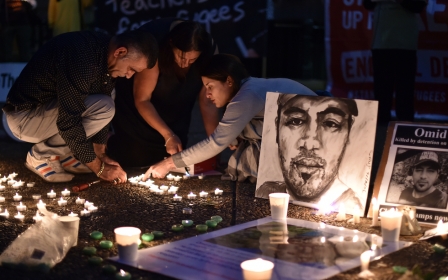Security firm backs out of Australia's refugee camps

A leading Australian security provider has become the latest company to walk away from the government's controversial asylum-seeker detention camps on Pacific islands, following in the footsteps of Spanish construction giant Ferrovial.
The centres in Nauru, and Papua New Guinea's Manus Island - where asylum-seekers who try to reach Australia by boat are sent - have been slammed by Australian and international refugee and human rights advocates over conditions there.
Wilson Security, which has provided security at the centres since 2012, said late Thursday it would not tender for further services after the current contract ends in October 2017.
The provision of such services was "not in line with [the company's] long-term strategic priorities," it said in a statement.
The exact size of the contracts is not known, but is believed to be large - Canberra awarded a US $920 million contract to Transfield, now Ferrovial's Broadspectrum, in 2014.
But service providers have been subjected to campaigns such as No Business in Abuse amid claims that some asylum-seekers held in the camps have suffered sexual assault.
One of Australia's biggest pension funds, HESTA, last year divested from its stake in Transfield saying that claims of rights breaches at the centres were contrary to international law and therefore its policies.
Ferrovial, which owns London's Heathrow airport, said in May when it was finalising a takeover of Sydney-based Broadspectrum that the detention services were not core to the acquisition and "not a strategic activity in Ferrovial's portfolio".
Wilson's announcement comes two weeks after Canberra agreed to close the Manus camp following a ruling by the Supreme Court of Papua New Guinea in April declaring that holding people there was unconstitutional and illegal.
The Nauru facility has also been under scrutiny after thousands of incident reports leaked to the Guardian Australia in August detailed allegations of widespread abuse and self-harm, including children wanting to kill themselves.
In April, an Iranian asylum seeker who had been detained on Naura for three years died after setting himself on fire - earlier that month another Iranian was convicted of attempted suicide, a criminal offence on Naura.
Advocacy group GetUp, which backs No Business in Abuse, welcomed Wilson's decision and said it reflected a failure of the government's asylum-seeker policies.
Despite criticism of its offshore policy, Australia's conservative government has strongly defended it, saying it has halted the spate of boat arrivals and drownings, of earlier years.
Stay informed with MEE's newsletters
Sign up to get the latest alerts, insights and analysis, starting with Turkey Unpacked
Middle East Eye delivers independent and unrivalled coverage and analysis of the Middle East, North Africa and beyond. To learn more about republishing this content and the associated fees, please fill out this form. More about MEE can be found here.




